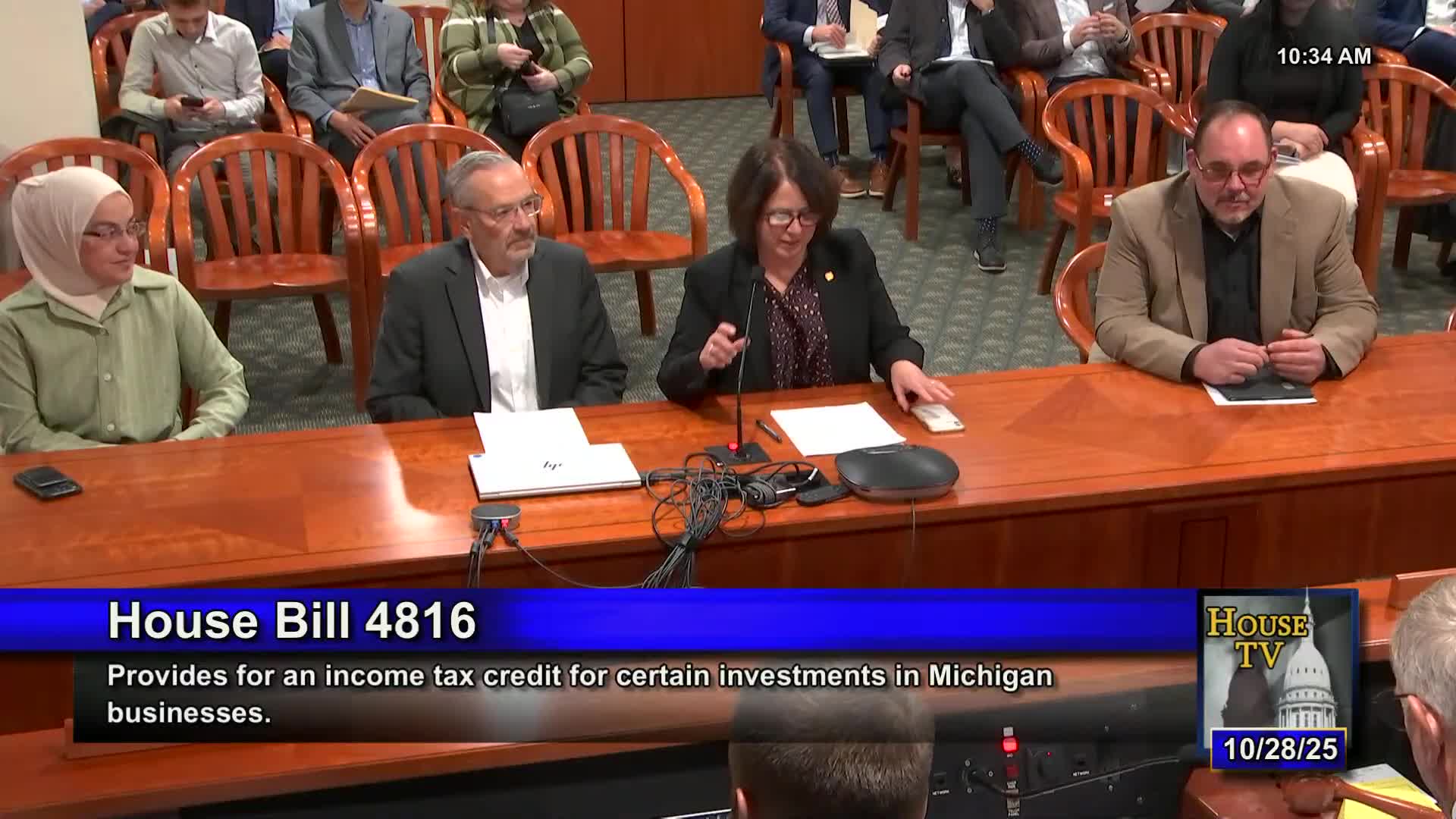Committee hears bill to give Michigan residents a 50% tax credit for local investments
Get AI-powered insights, summaries, and transcripts
Subscribe
Summary
Representative Jenkins introduced House Bill 48‑16 to create a tax credit intended to encourage non‑accredited (retail) Michigan residents to invest in qualified Michigan businesses. Proponents said the credit would recirculate capital locally and cited prior Michigan and international models; fiscal impact was described as “unknown.”
Representative Jessica Jenkins Arno introduced House Bill 48‑16, which would offer Michigan residents a tax credit equal to 50% of certain qualifying investments in Michigan businesses, the bill’s sponsor told the House Committee on Finance on Oct. 28.
"It's beyond time that we start looking for better ways to incentivize Michiganders to increase their economic opportunities and this is a great way to start," Jenkins said in opening testimony. She described the proposal as creating a tax credit to encourage local investment and local ownership.
In committee testimony, Jenkins described the credit as a 50% tax credit and gave multiple figures for annual limits: at one point she said the credit would have "an annual maximum benefit of $6,000 per year," and in other remarks she said there is "a maximum benefit of $3,000 with investments up to $6,000 per year." The bill also would allow unused credits to be carried forward for up to 10 years, she said.
Chris Miller, a special projects consultant who said he represents a telescope manufacturer relocated to Adrian and the National Coalition for Community Capital, said the proposal targets "retail investors" (non‑accredited individuals) to help finance projects such as small business growth and neighborhood real‑estate redevelopment. "We're about activating those community members, giving them an opportunity to be investors and owners and build wealth and recirculate capital in all of our communities," Miller said.
Developer Brent Forsberg described a pilot project in Southwest Lansing that organizers hope would accept small dollar investments from community residents and provide training and career pathways tied to development. Janan Jaundy of the Center for Regional Economic Innovation said the policy could help low‑income communities "build and retain new jobs in the state of Michigan." Miller and Forsberg emphasized the ability for an investor to participate with relatively small dollar amounts; Miller cited a possible $100 minimum investment.
Proponents cited precedents and modeling choices in their testimony. Jenkins and Miller referenced the 2013 Michigan Invest Locally Exemption (MILE Act) as prior state action in this policy space and said the bill uses an IRS‑style ‘‘80% rule’’ definition to identify businesses that qualify as Michigan businesses (a business with a majority of property, employees and sales in Michigan). They also pointed to a 2019 white paper about a similar Nova Scotia program, which proponents said raised about CA$2 million, used roughly CA$800,000 in tax credits and reportedly produced broader tax receipts; witnesses said that example supported the claim that the credit could be near revenue neutral or revenue positive, but they described Michigan's fiscal impact as unknown.
Committee members asked for clarification on how the bill treats out‑of‑state sales and the IRS standard cited in testimony. Representative Posthumance asked whether the bill intended to count sales "generated from" Michigan locations; Jenkins said the bill adopted the IRS definition used in prior Michigan legislation but that staff could provide a more detailed explanation of the IRS rule.
When asked about fiscal cost, proponents said the cost is uncertain. Miller said the Michigan Department of Treasury had previously "agreed not to oppose" similar proposals in prior sessions but that an exact estimate for this bill is not yet available.
No formal committee vote on House Bill 48‑16 occurred during this session; the item was taken as testimony and public comment was recorded from several organizations that submitted cards in support but did not speak.
Why it matters: Proponents framed the credit as a tool to direct capital back into local communities, increase local ownership and expand investment opportunities for ordinary Michiganders who lack access to accredited investment routes.
